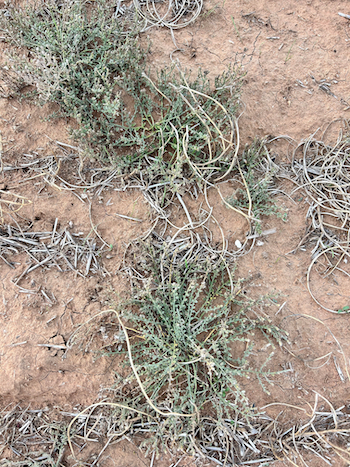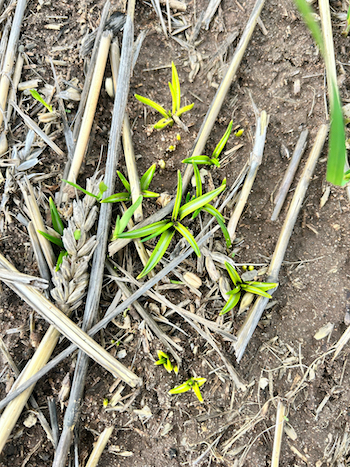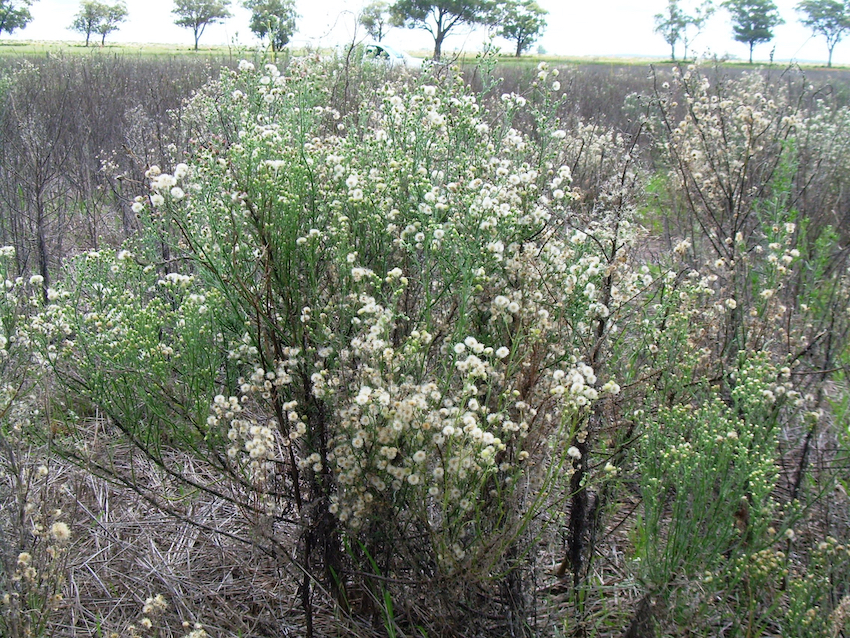Rosinweed and Star of Bethlehem targeted in Victoria
By Kelly Angel, Birchip Cropping Group
 Rosinweed, post flowering. Photo: Birchip Cropping Group
Rosinweed, post flowering. Photo: Birchip Cropping Group
The management of various weeds that tend to be localised or geographically discrete is being facilitated by discussions and knowledge-sharing that takes place through the National Grower Network (NGN).
The network was set up to capture ideas, issues, constraints and opportunities for research, development and extension. It is open to all growers, advisers, researchers and industry parties. One example of research arising from this forum is a project now investigating two weeds that are proving hard to control in the Victorian Mallee and Wimmera cropping systems.
The first is rosinweed, a native plant that likes swampy and slightly saline soils. This soil type occurs on the southern reaches of the Mallee and northern parts of the Wimmera, especially near flood-prone river systems. The second is Star of Bethlehem, an ornamental species likely to have escaped from gardens. It is tolerant to herbicides and, when conditions are right, the plant is prolific at setting new bulbs.
These weeds tend to start out in small patches, but it is important to control them early before they reach levels that compete directly with crops (Star of Bethlehem) or draw off water and nutrients during the summer (rosinweed).
 Emerging Star of Bethlehem weed. Photo: Birchip Cropping Group
Emerging Star of Bethlehem weed. Photo: Birchip Cropping Group
In 2021, a project was launched to explore management options for these stubborn, locally significant weeds. It began with a systematic evaluation of herbicide options undertaken as pot trials by the University of Adelaide’s Gurjeet Gill and Ben Fleet. To date, these pot trials have:
- identified paraquat and metsulfuron as able to reduce Star of Bethlehem bulb set; and
- identified root fragments as an important route for rosinweed proliferation rather than seed-set, which rules out cultivation as a control option.
Once herbicide efficacy is broadly understood, the project moves to the paddock to explore management strategies under cropping conditions.
Importantly, the protocols under development aim to fit with existing farm management practices and rotations. Special consideration is being given to avoid weed control issues already faced by Victorian growers, such as residue carryover and application timings that interfere with crop establishment.
At the paddock phase, researchers are engaging with growers to further refine the trial’s design. Consultations will continue through the life of the project.
The field phase began in 2023. Metsulfuron and paraquat form the basis of a four-treatment field trial targeting Star of Bethlehem in the Wimmera. The rosinweed trials will begin in the Mallee during the summer of 2023-24, with the trial’s design in the final stages of planning.
The assessments will include:
- initial weed population counts;
- marking of weeds in different categories of size or maturity;
- photos and scores using European Weed Research Council (EWRC) rating scales to determine herbicide efficacy; and
- multiple rounds of scoring in accordance with weed biology.
More information: Kelly Angel, kelly@bcg.org.au
The bane of the summer fallow in central NSW
By Maurie Street, Grains Orana Alliance
After consulting with growers in central NSW over five NGN meetings in 2022, an emerging and escalating issue was identified relating to weed control during the summer fallow.
A key concern for growers is conserving soil moisture over summer by limiting weed growth with herbicides. Increasingly, however, spray applications are becoming less effective, more frequent and more expensive.
A closer look has revealed that the driving force behind the increased spraying frequency and cost is mainly being driven by two weeds: milk thistle and fleabane.

Fleabane (pictured), together with milk thistle, are the key drivers of weed control costs during the summer fallow in the Narromine region of NSW. Photo: Grains Orana Alliance
Fleabane emerges beneath the winter crop and by the time of the summer fallow, its growth may be so pervasive that a double knock is required. Even then, the herbicide treatment may not succeed. In wet years the problem can become overwhelming.
With milk thistle, the problem is so prolific – and the herbicide choices difficult to get right – that controlling this weed is setting the cost for summer fallow weed control. Also, as more spray applications are required, the risk of developing herbicide-resistant weeds increases. Resistance then further increases a farm’s weed-control complexity.
In response to these challenges, GRDC has invested in field trials that seek seek to reduce the demand, frequency and complexity of controlling summer fallow weeds, including fleabane and milk thistle, by exploring different herbicide treatment options. The trials started in 2023 in growers’ paddocks using actual farming practices in the Narromine region.
A key focus with fleabane is to intercept germination that occurs beneath the winter crop in spring. For milk thistle, the trials will explore a range of treatments to identify options that can stop new plants germinating with each flush of rain. This will involve exploring chemical treatments that involve both new and old herbicides.
The NGN meetings that led to this investment in research were held in Canowindra, Trundle, Wellington, Narromine and Tottenham in NSW.
More information: Maurie Street, maurie.street@grainorana.com.au
Marshmallow no soft touch in WA
By Garren Knell, ConsultAg
In the western growing region, the introduction of no-till cropping enabled marshmallow weeds to migrate from sheep yards into cropping paddocks. The weed is proving difficult to control given its natural tolerance to glyphosate and its large canopy.
It also develops a deep root that sucks vital moisture from soils over the autumn fallow. It can survive most standard summer spray strategies that target melons and volunteers.
Marshmallow favours alkaline or higher pH soils and it can gain a toehold on clay patches within sandier paddocks. Consequently, controlling the larger plants requires more-expensive herbicide treatments: glyphosate spiked with a Group 14 herbicide, followed by a double knock with paraquat or Spray.Seed®.
The need for improved marshmallow management options and decision-making was raised by growers in southern WA. Of particular concern was early germinations during the fallow period (in late summer and early autumn), as these result in large plants being present at sowing. These plants are expensive and difficult to control and have often already dried the soil profile, making crop establishment harder.
These plants then have several adverse effects:
- they reduce crop yield through competition;
- they potentially cause grain contamination at harvest;
- they can be host plants for some insects; and
- their large canopy can potentially intercept pre-emergent herbicides from reaching the soil surface, thereby affecting the control of subsequent germinations.
An investment was made by GRDC for two years’ worth of field trials to mitigate these effects. Field work began in 2023 led by ConsultAg.
The trials are attempting to identify best-practice techniques for both continuous cropping systems and rotations that include a legume pasture, such as medic.
For continuous croppers, the trials will focus on improved options to knock down pre-crop weeds in order to eradicate marshmallow from the paddock. These knock-down trials include evaluating new-generation Group 14 herbicides versus old Group 14 products, as well as evaluating a range of other registered herbicides.
For crop/pasture rotations, ConsultAg has identified that often marshmallow grows uncontrolled in pasture years, creating greater problems for the subsequent crop. The project will evaluate the control provided by a range of registered herbicides in legume pastures to help minimise the build-up of marshmallow.
In-crop trials have also been established where marshmallow has been left uncontrolled in autumn to generate in-crop survivors of large plants. A range of registered, in-crop broadleaf herbicides will then be evaluated for their efficacy in controlling these larger plants in-crop.
The trials are underway in growers’ paddocks at three locations in WA: Narrogin, Lake Grace and Newdegate. In the first year, the trials are taking a broad-brush approach that casts a wide net on control options. In the second year, the focus will be to refine the strategy and optimise it to best-practice standards and extend the key findings to growers.
More information: Garren Knell, gk@consultag.com.au

























































